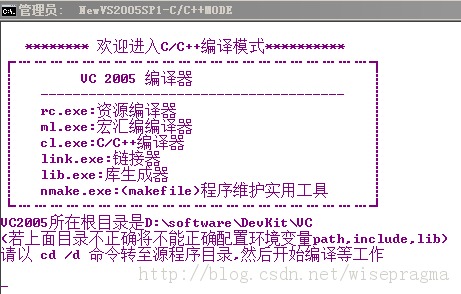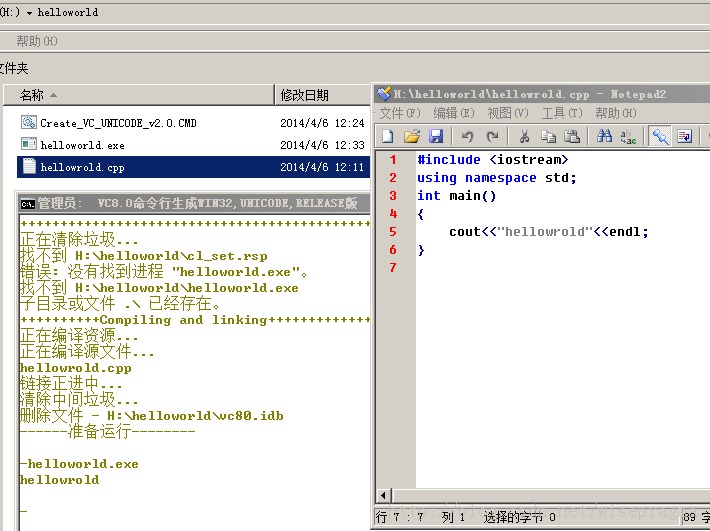Some people haven't written HelloWorld for three months; some people don't know what the compiler is; some people compile the first helloworld, hundreds of ERROR s, lose half of their confidence.
Learn c++, want to test exercises, do not know how to start, you still repeat the new project in the IDE, and then produce a large piece of junk files.
In fact, there is another way of compiling:
That's the legendary Notepad plus command line compilation. As long as you have a U disk, only a computer with windows can write code.
First, you need Platform SDK
WIN7 Windows SDKSMicrosoft Official Download Page
1.GRMSDK_EN_DVD.iso X86(32bit)
2.GRMSDKIAI_EN_DVD.iso I64(Itanium)
3.GRMSDKX_EN_DVD.iso AMD64(64bit)
2. After installation, create a new cmd file under the installed root directory (including Platform SDK, lib, include directory) as follows (take VC8.0 as an example)
@echo off @prompt $h @title NewVS2005SP1-C/C++MODE color f5 if "#%vc2005dir_defined%"=="#" (set vc2005dir=%cd%&& set vc2005dir_defined=true) if "#%path0_defined%"=="#" (set path0=%path% && set path0_defined=true ) @echo. @echo ******** Welcome to C/C++Compilation mode********** @echo ┏┅┅┅┅┅┅┅┅┅┅┅┅┅┅┅┅┅┅┅┅┅┅┓ @echo ┋ VC 2005 Compiler ┋ @echo ┋ -------------------------------------- ┋ @echo ┋ rc.exe:Resource Hacker ┋ @echo ┋ ml.exe:Macro Assembler Compiler ┋ @echo ┋ cl.exe:C/C++Compiler ┋ @echo ┋ link.exe:Linker ┋ @echo ┋ lib.exe:Lib Gen ┋ @echo ┋ nmake.exe:(makefile)Program Maintenance Utility ┋ @echo ┗┅┅┅┅┅┅┅┅┅┅┅┅┅┅┅┅┅┅┅┅┅┅┛ @set PATH=%path0%;%vc2005dir%\bin;%vc2005dir%\PlatformSDK\Bin;%vc2005dir%\myTOOL\windbg\ @set INCLUDE=%vc2005dir%\include;%vc2005dir%\PlatformSDK\Include;%vc2005dir%\atlmfc\include;%vc2005dir%\DirectX_SDK\Include;%vc2005dir%\WTL\Include @set LIB=%vc2005dir%\lib;%vc2005dir%\PlatformSDK\Lib;%vc2005dir%\atlmfc\lib;%vc2005dir%\DirectX_SDK\Lib\x86; rem Setting debug symbol paths @set _NT_SYMBOL_PATH=%vc2005dir%\myTOOL\windbg\symbols @echo VC2005 The root directory is%vc2005dir% @echo (If the above directory is incorrect, environment variables will not be configured correctly path,include,lib) @echo Please use cd /d Command to source directory,Then start compiling and so on. echo. PROMPT - if "#%once_defined%"=="#" ( set once_defined=true&&%comspec% /k)

Type CL /? LINK /? Make sure it's correct
3. Whether it's annoying to hit commands every time, there should be another way to generate the target, create a new document Create_VC_UNICODE_v2.0.CMD, and then add the VC path.
if exist D:\software\DevKit\VC set vc2005dir=D:\software\DevKit\VC
@title VC8.0 Command Line Generation WIN32,UNICODE,RELEASE edition @rem by wisepragma @PROMPT - @ECHO off @echo +++++++++++++++++++++++++++++++++++++++++++++++++++++++++ rem color 0a color f6 rem Configure here vc Root directory if exist D:\Software\VC8.0NEW set vc2005dir=D:\Software\VC8.0NEW if exist D:\software\DevKit\VC set vc2005dir=D:\software\DevKit\VC @set PATH=%path%;%vc2005dir%\bin;%vc2005dir%\PlatformSDK\Bin;%vc2005dir%\myTOOL\windbg\;%vc2005dir%\myTOOL\leakdiag @set INCLUDE=%vc2005dir%\include;%vc2005dir%\PlatformSDK\Include;%vc2005dir%\atlmfc\include;%vc2005dir%\DirectX_SDK\Include;%vc2005dir%\WTL\Include @set LIB=%vc2005dir%\lib;%vc2005dir%\PlatformSDK\Lib;%vc2005dir%\atlmfc\lib;%vc2005dir%\DirectX_SDK\Lib\x86; rem No spaces or Chinese,Will make mistakes,Garbled rem Take the current directory name as the program name for %%i in (.) do set outfile=%%~ni rem set outfile=color set outdir=.\ set cedir=temp set cd0=%cd% @echo Waste is being cleared... >>nul del /f /s /q cl_set.rsp link_set.rsp rc_set.rsp *.res *.idb *.pdb *.obj *.exp *.exe.embed.manifest *.exe.intermediate.manifest *.ncb *.user *.pch *.ilk *.dep BuildLog.htm *.rc2 taskkill.exe /im %outfile%.exe del /f /s /q %outfile%.exe md "%outdir%" @echo ++++++++++Compiling and linking+++++++++++++++++++++++++++++++++++++ @echo Compiling resources... for %%x in (*.rc) DO rc /v %%x @echo Compiling source files... rem /D "_ATL_MIN_CRT" Will produce ERROR:LNK2005 XXX Already in atlmincrt.lib(atlinit.obj) Definition in >cl_set.rsp echo /O1 /FD /MT /D "NDEBUG" /D "STRICT" /D "WIN32" /D "_WINDOWS" /D "_UNICODE" /D "UNICODE" /EHsc /fp:fast /GR- /W3 /c /TP /Os /Fo"%outdir%/" >>cl_set.rsp dir /b *.cpp cl @cl_set.rsp /W3 /nologo @echo Links in progress... >link_set.rsp echo "/OUT:%outfile%.exe" /INCREMENTAL:NO /MANIFEST:NO /NODEFAULTLIB:"oldnames.lib" /STACK:65536,4096 /MACHINE:X86 kernel32.lib user32.lib gdi32.lib winspool.lib comdlg32.lib advapi32.lib shell32.lib ole32.lib oleaut32.lib uuid.lib odbc32.lib odbccp32.lib @rem /SUBSYSTEM:WINDOWS >>link_set.rsp dir /b *.res *.obj link @link_set.rsp /nologo /ERRORREPORT:PROMPT @REM judge if exist %outfile%.exe goto goahead :ABORT rem COLOR 0c rem color f0 color f3 cd %cd0% %comspec% /k :goahead echo Clean up intermediate garbage... del *.res *.obj *.rsp @del /f /s /q *.aps *.idb *.pdb *.exp *.exe.embed.manifest *.exe.intermediate.manifest *.ncb *.user *.pch *.ilk *.dep BuildLog.htm *.rc2 echo ------Ready to run-------- @echo on %outfile%.exe @rem start %outfile%.exe @ECHO. @%comspec% /k
So we can compile helloworld.cpp
Put the source file in a new directory, copy Create_VC_UNICODE_v2.0.CMD into it, and double-click CMD to generate automatically.#include <iostream> using namespace std; int main() { cout<<"hellowrold"<<endl; }

Another example code
//Range of values for C++ numeric types #include "stdio.h" #include "iostream" using namespace std; int main() { char a1=-128;//-128~+127 short b1=-32768;// -32768~+32767 int c1=-2147483648;//-2147483648~+2147483647 long d1=-2147483648;//-2147483648~+2147483647 long long x1=-9223372036854775808;//-9223372036854775808~9223372036854775807 //Take -1 below and convert it to the maximum value. unsigned char a2=-1;//0~255 unsigned short b2=-1;// 0~65535 unsigned int c2=-1;//0~4294967295 unsigned long d2=-1;//0~4294967295 unsigned long long x2=-1;//0~18446744073709551615 float e=100/3.0;//10e+38,6-digit significant digit-7 double f=100.0/3;//10e+308,12-bit significant digits-16 long double g=100.0/3;//10 + 4932, 15-digit significant digit-16 cout.precision(50); cout<<"Test platform:Intel P4,XPsp3-32bit,VC8.0"<<endl; cout<<"Floating point accuracy test 100 divided by 3"<<endl; cout<<"float \t\t e="<<e<<endl; cout<<"double \t\t f="<<f<<endl; cout<<"long double \t g="<<g<<endl; cout<<"The minimum values of signed numbers are"<<endl; printf("char a1 ->%d\n",a1); cout<<"short b1 ="<<b1<<endl; cout<<"int c1 ="<<c1<<endl; cout<<"long d1 ="<<d1<<endl; cout<<"long long x1 ="<<x1<<endl; cout<<"....Minimum value minus one more,Maximum spillover"<<endl; a1--;b1--;c1--;d1--;x1--; printf("char a1 ->%d\n",a1); cout<<"short b1 ="<<b1<<endl; cout<<"int c1 ="<<c1<<endl; cout<<"long d1 ="<<d1<<endl; cout<<"long long x1 ="<<x1<<endl; cout<<"Maximum unsigned number(-1)Namely"<<endl; printf("unsigned char a2 ->%d\n",a2); cout<<"unsigned short b2 ="<<b2<<endl; cout<<"unsigned int c2 ="<<c2<<endl; cout<<"unsigned long d2 ="<<d2<<endl; cout<<"unsigned long long x2 ="<<x2<<endl; cout<<"...Maximum value,After adding one,overflow,Zeroing(minimum value)"<<endl; a2++;b2++;c2++;d2++;x2++; printf("unsigned char a2 ->%d\n",a2); cout<<"unsigned short b2 ="<<b2<<endl; cout<<"unsigned int c2 ="<<c2<<endl; cout<<"unsigned long d2 ="<<d2<<endl; cout<<"unsigned long long x2 ="<<x2<<endl; cout<<"....After zero reduction,Overflow again,Maximum value,So don't take countless numbers and less than zero."<<endl; a2--;b2--;c2--;d2--;x2--; printf("unsigned char a2 ->%d\n",a2); cout<<"unsigned short b2 ="<<b2<<endl; cout<<"unsigned int c2 ="<<c2<<endl; cout<<"unsigned long d2 ="<<d2<<endl; cout<<"unsigned long long x2 ="<<x2<<endl; cout<<"Storage size"<<endl; cout<<"sizeof(char) ="<<sizeof(char)<<"byte" <<endl; cout<<"sizeof(short) ="<<sizeof(short) <<"byte" <<endl; cout<<"sizeof(int) ="<<sizeof(int)<<"byte" <<endl; cout<<"sizeof(long) ="<<sizeof(long )<<"byte" <<endl; cout<<"sizeof(long long) ="<<sizeof(long long)<<"byte" <<endl<<endl; cout<<"sizeof(unsigned char) ="<<sizeof(unsigned char)<<"byte" <<endl; cout<<"sizeof(unsigned short) ="<<sizeof(unsigned short )<<"byte" <<endl; cout<<"sizeof(unsigned int) ="<<sizeof(unsigned int )<<"byte" <<endl; cout<<"sizeof(unsigned long) ="<<sizeof(unsigned long )<<"byte" <<endl; cout<<"sizeof(unsigned long long) ="<<sizeof(unsigned long long)<<"byte" <<endl<<endl; cout<<"sizeof(float) ="<<sizeof(float )<<"byte" <<endl; cout<<"sizeof(double) ="<<sizeof(double)<<"byte" <<endl; cout<<"sizeof(long double) ="<<sizeof(long double )<<"byte" <<endl; //Other methods (# include "limits"// other methods /* cout<<"---------The following maxima - ----------------------------""endl"; cout<< numeric_limits<unsigned long long >::max() <<endl; cout<< numeric_limits< long long >::max() <<endl; cout<<"---------The following minimum -------------------------------- "___________ endl; cout<< numeric_limits<unsigned long long >::min() <<endl; cout<< numeric_limits<long long>::min() <<endl; */ //long long value - 2E (sizeof (long) * 8) / 2 ~ 2E (sizeof (long) * 8) - 1 //The unsigned long length is 0~2E (sizeof (unsigned long)*8) -1 return 0; }
Operation result
+++++++++++++++++++++++++++++++++++++++++++++++++++++++++ Waste is being cleared. H: helloworld New folder cl_set.rsp could not be found Error: No process "New Folder. Ex" was found. Delete files - H: helloworld New folder New folder. exe Subdirectory or file. already exists. ++++++++++Compiling and linking+++++++++++++++++++++++++++++++++++++ Compiling resources... The source file is being compiled. howwide.cpp Howwide. CPP (9): warning C4146: Univariate negative operators applied to unsigned types, the result is still unsigned Howwide. CPP (10): warning C4146: Univariate negative operators applied to unsigned types, and the result is still unsigned Howwide. CPP (11): warning C4146: Univariate negative operators applied to unsigned types, the result is still unsigned The link is in progress. Clean up the intermediate garbage ___________. Delete file - H: helloworld New folder vc80.idb Ready for operation - New folder. exe Test results: Floating point accuracy test 100 divided by 3 float e=33.33333206176757800000000000000 double f=33.33333333333333600000000000000 long double g=33.33333333333333600000000000000 The minimum values of signed numbers are char a1 ->-128 short b1 =-32768 int c1 =-2147483648 long d1 =-2147483648 long long x1 =-9223372036854775808 The lowest value is reduced by one, and the spillover is maximized. char a1 ->127 short b1 =32767 int c1 =2147483647 long d1 =2147483647 long long x1 =9223372036854775807 The maximum unsigned number (-1) is unsigned char a2 ->255 unsigned short b2 =65535 unsigned int c2 =4294967295 unsigned long d2 =4294967295 unsigned long long x2 =18446744073709551615 ... Maximum, add one, spill over, return to zero (minimum) unsigned char a2 ->0 unsigned short b2 =0 unsigned int c2 =0 unsigned long d2 =0 unsigned long long x2 =0 After zero minus one, it spills over again to get the maximum, so don't take countless numbers and less than 0. unsigned char a2 ->255 unsigned short b2 =65535 unsigned int c2 =4294967295 unsigned long d2 =4294967295 unsigned long long x2 =18446744073709551615 Storage size Sizeof (char) = 1 byte Sizeof (short) = 2 bytes Sizeof (int) = 4 bytes Sizeof (long) = 4 bytes Sizeof (long) = 8 bytes Sizeof (unsigned char) = 1 byte Sizeof (unsigned short) = 2 bytes Sizeof (unsigned int) = 4 bytes Sizeof (unsigned long) = 4 bytes Sizeof (unsigned long) = 8 bytes Sizeof (float) = 4 bytes Sizeof (double) = 8 bytes sizeof(long double) =8 bytes -
Reproduced in: https://my.oschina.net/u/160145/blog/264399